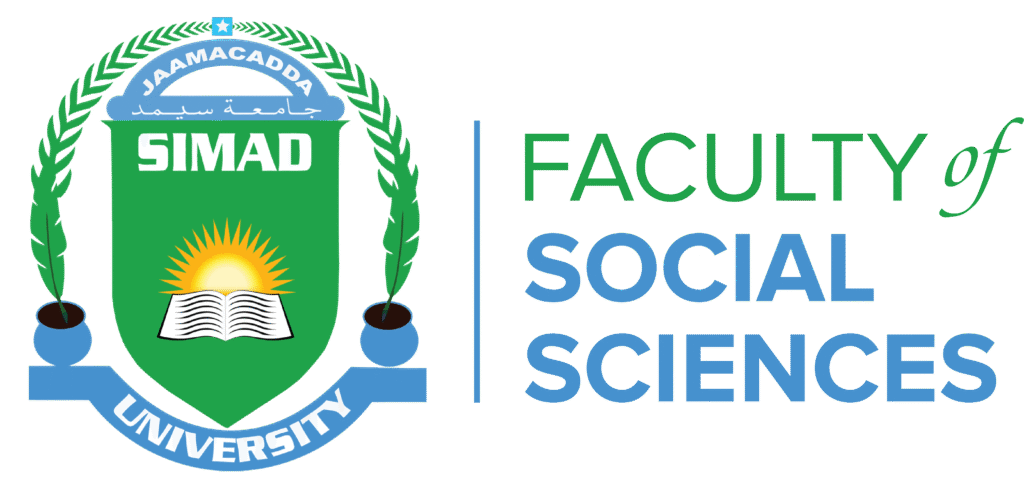Developmental Studies
Introduction
The world is facing critical challenges of poverty, inequality, and environmental sustainability. At SIMAD University, our Bachelor of Development Studies program prepares students to critically analyze these issues and design inclusive, practical solutions for a more equitable and sustainable future. The program equips graduates with the skills to address development challenges at the local, national, and international levels.
Program Goals
The program is designed to:
-
Build a strong foundation in development theory and practice.
-
Promote analytical, research, and problem-solving skills for addressing real-world development issues.
-
Prepare graduates to serve as change agents in government, NGOs, and international organizations.
-
Cultivate a commitment to social justice, ethical practice, and sustainable development.
Program Objectives
By completing the program, students will:
-
Gain the ability to analyze social, economic, and environmental development challenges.
-
Conduct research and apply findings to inform evidence-based policy-making.
-
Engage in community-based projects that promote inclusion, empowerment, and resilience.
-
Acquire the skills needed to influence development policy, planning, and implementation.
-
Be well-prepared for graduate studies or professional roles in development fields.
Why Choose This Program?
Our curriculum offers a unique balance of theory and practice:
-
Courses explore poverty reduction, governance, inequality, and sustainability.
-
Research opportunities provide students with the tools to evaluate development programs and outcomes.
-
Partnerships with NGOs, international organizations, and local communities allow students to apply classroom learning in real-world settings.
-
Practical fieldwork and internships ensure graduates leave with hands-on experience in development work.
Career Opportunities
Graduates of Development Studies at SIMAD University are well-prepared to work in:
-
Government ministries and public sector agencies
-
National and international NGOs
-
United Nations and other international organizations
-
Community development projects
-
Research and policy analysis institutions
-
Environmental and sustainability initiatives
- Completion of secondary school with a minimum overall average of 50%
- Should bring the original and a copy of secondary school certificate
- Should bring Six (6) passport size photos with white background
- Should bring the original copy of a letter of good conduct issued by your secondary school
- Should bring a sponsorship letter from your guardian
- Should successfully pass an admission interview and/or test
- Pay non-refundable Processing and ID card fees of USD $50 (bank draft)
COURSE STRUCTURE
The Faculty of Social Science offers undergraduate programs, and the course structure includes university, faculty, interdepartmental, and specialization courses across all departments.
UNIVERSITY COURSES
The aim of these courses is to provide a foundational knowledge base that supports the specialization in International Relations and other social science disciplines. Here is an overview of the university courses we offer:
IML I
Computer Studies
Arabic Language I
Islamic Studies I
Study Skills
IML II
CAT
Arabic Language II
Introduction to International Relations
Communication Skills
ISL.STUDY II
Research Methodology
Graduation Project
FACULTY COURSES (International Relations)
The Faculty of Social Science offers a wide range of courses that provide students with an in-depth understanding of global political dynamics, international institutions, and foreign relations. Here is an overview of the International Relations faculty courses:
Introduction to International Relations
International Political Economy
Global Governance and International Law
Comparative Politics
International Security Studies
Diplomacy and Foreign Policy
International Organizations and Institutions
Conflict Resolution and Peace Studies
International Human Rights
Global Environmental Politics
Political Theory and International Relations
Regional Political Systems
International Trade and Economic Relations
International Development and Globalization
Humanitarian Affairs and International Aid
Political Risk Analysis
International Business and Finance
International Marketing
Geopolitics and Strategic Studies
INTER-DEPARTMENTAL AND SPECIALIZATION COURSES (International Relations)
The Department of International Relations collaborates with other departments within the Faculty of Social Science, ensuring that students acquire a well-rounded understanding of political, economic, and social systems. Below are the interdepartmental and specialization courses for International Relations:
International Conflict Management
Public Diplomacy and Communication
International Media and Global News
Migration and Refugee Studies
Security and Terrorism Studies
International Legal Systems
International Economic Policies
Global Health and International Relations
International Relations and the African Union
Cybersecurity and International Relations
Global Trade Law
Humanitarian Law
Global Political Movements
Foreign Policy Analysis
International Relations Theory
International Environmental Policy
Globalization and its Impact on States
Full time: 5 Years
Fees($): $315.00
Charges($): $30.00
Total($): $345.00
STUDENTS FEES PAYMENT POLICY
This policy applies to all students, these include: part-time and full-time for both undergraduate and postgraduate and any other person enrolled as a student at the University:
- Option one: At the beginning of the semester, all semester fees can be paid in full.
- Option two: At the beginning of the semester, students should pay 30% of semester fees before he/she registers for the class. In the second installment, 40% of the semester fees should be paid before the midterm exam. The remaining 30% of the semester fees should be paid before the final exam.
- After payments of second and third installments, students are eligible to get their clearance cards for midterm and final exams.
- Fees Collector officer will be responsible to check fees default when he/she gets a report from the head of the cash unit.
- SU will not refund any fees paid unless the student has no remaining semester.
- Students and sponsors who unintentionally or intentionally deposit fees will not be refunded but will be forwarded to the next semesters.
- Upon graduation period, all extra fees balance should be refunded to the students.
- Any student who temporarily or permanently breaks his/her study can request an extra fee refund.
- Head of Cash Unit should check the activities of the sponsors.
Bank Accounts
Premier Bank: 20300001001
Dahabshiil: 1822
Salam Bank: 30027598
Idman Community Bank: 7401005
IBS Bank: 1820
The SU academic year consists of 42 weeks split into two semesters of 18 weeks each, the first beginning in August.
